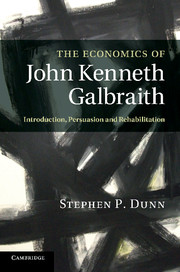Book contents
- Frontmatter
- Contents
- List of figures
- List of tables
- Foreword
- Preface
- Acknowledgments
- 1 The eclipse of The New Industrial State?
- 2 A life in our times
- 3 The economics of John Kenneth Galbraith
- 4 The methodology of John Kenneth Galbraith
- 5 The general theory of advanced development
- 6 Why people are poor
- 7 Uncertainty and the modern corporation
- 8 A theory of the multinational corporation
- 9 The management of specific demand
- 10 Money and the real world
- 11 A man for our times
- 12 The origins of the Galbraithian system: talking to John Kenneth Galbraith
- References
- Additional works by Galbraith
- Index
2 - A life in our times
Published online by Cambridge University Press: 10 January 2011
- Frontmatter
- Contents
- List of figures
- List of tables
- Foreword
- Preface
- Acknowledgments
- 1 The eclipse of The New Industrial State?
- 2 A life in our times
- 3 The economics of John Kenneth Galbraith
- 4 The methodology of John Kenneth Galbraith
- 5 The general theory of advanced development
- 6 Why people are poor
- 7 Uncertainty and the modern corporation
- 8 A theory of the multinational corporation
- 9 The management of specific demand
- 10 Money and the real world
- 11 A man for our times
- 12 The origins of the Galbraithian system: talking to John Kenneth Galbraith
- References
- Additional works by Galbraith
- Index
Summary
What John Kenneth Galbraith's life gives us is more than the chance to see the prodigious career of a single man. It is the opportunity to revisit not only his own views about how modern economies (and governments) should operate, but the larger world of transformed, and still transforming, economic theories of which they are a part and with which they sometimes clash, to gauge the economies they seek to guide, and thus to understand something larger about where we are all now going.
Richard Parker (2005: 14)Galbraith himself has been immersed in politics almost from the cradle.
Arthur M. Schlesinger, Jr (1999: 29)John Kenneth Galbraith was one of the leading progressive intellectuals of the post-World War II period. He is principally associated with writing a series of intellectually demanding yet rewarding books, aimed at a general readership. His purpose was to alert the public to the social consequences of the major transformations in the economic structure that were occurring, notably the rise of the modern corporation. His disdain and sarcastic wit targeted abuses of business power and the sometimes unjust accumulation of private wealth, in the context of poor and under-funded public services.
Galbraith's analysis was hugely shaped by the events, circumstance, and political philosophy that influenced him. But Galbraith was more than just an academic. He was a man of practical affairs who enjoyed and benefited from a wide and varied set of roles, ranging from speechwriter, journalist, political advisor, bureaucrat and administrator, government analyst and ambassador.
- Type
- Chapter
- Information
- The Economics of John Kenneth GalbraithIntroduction, Persuasion, and Rehabilitation, pp. 16 - 43Publisher: Cambridge University PressPrint publication year: 2010

